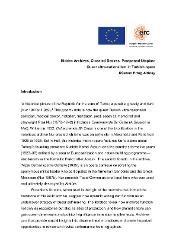| dc.contributor.author | Altınay, Rüstem Ertuğ | |
| dc.date.accessioned | 2022-11-30T12:58:45Z | |
| dc.date.available | 2022-11-30T12:58:45Z | |
| dc.date.issued | 2022-10-03 | |
| dc.identifier.citation | Rüstem Ertuğ Altınay (2021) Hidden Archives, Closeted Desires, Postponed Utopias, Performance Research, 26:8, 116-125, DOI: 10.1080/13528165.2021.2088115 | en_US |
| dc.identifier.issn | 1352-8165 | en_US |
| dc.identifier.issn | 1469-9990 | en_US |
| dc.identifier.uri | https://hdl.handle.net/20.500.12469/4343 | |
| dc.description.abstract | How do queer intellectuals produce dramatic texts for utopian archival projects? How do (once) hidden theatre practices exist in a complicated relationship with the claims about covert or clandestine performances in the messy afterlives of such unorthodox archives? This essay explores such processes and how they unfolded in the context of Turkish opera by focusing on the work of Rıza Nur (1879-1942).
Rıza Nur was a queer Turkish politician who created an archive of resistance to propagate his ultra-nationalist and eugenicist utopian vision for Turkey’s future during the country’s formative years. In addition to his proposed programs for Turkey’s revivification and the establishment of an ultra-nationalist party, the archive also included Nur’s memoirs, essays, poetry, and two of his librettos. Nur trusted this archive to multiple European libraries on the condition that it would not be accessible until 1960. Nur’s desire was that once his archive would become public, it would transform Turkish people’s understanding of the past, make them recognize him as an unappreciated true leader, and adopt his utopian vision.
Rıza Nur’s librettos demonstrate how operatic writing can function as an undercover strategy of queer self-making. The librettos reveal how archives function not only as repositories but also as sites of production, and how dramatic texts can gain queer dimensions and political significance in relation to other texts. Archives can thus provide crucial insights into discrete theatre practices and create important opportunities to review and revise performance historiographies. Nevertheless, the limited scholarly attention Nur’s librettos have received suggests how disciplinary and methodological conventions may render dramatic texts invisible even when they are in plain sight. Finally, Nur’s ultra-nationalist and eugenicist utopian archive challenges the tendency to associate queer utopian performance with progressive politics. | en_US |
| dc.description.sponsorship | European Research Council (ERC) 852216 STAGING-ABJECTION | en_US |
| dc.language.iso | eng | en_US |
| dc.rights | info:eu-repo/semantics/openAccess | en_US |
| dc.subject | N/A | en_US |
| dc.title | Hidden Archives, Closeted Desires, Postponed Utopias: Queer ultra-nationalism in Turkish opera | en_US |
| dc.type | article | en_US |
| dc.identifier.startpage | 116 | en_US |
| dc.identifier.endpage | 125 | en_US |
| dc.relation.journal | Performance Research | en_US |
| dc.identifier.issue | 8 | en_US |
| dc.identifier.volume | 26 | en_US |
| dc.department | Fakülteler, İletişim Fakültesi, Görsel İletişim Tasarımı Bölümü | en_US |
| dc.identifier.wos | WOS:000863574200015 | en_US |
| dc.identifier.doi | 10.1080/13528165.2021.2088115 | en_US |
| dc.identifier.scopus | 2-s2.0-85139145128 | en_US |
| dc.institutionauthor | Altınay, Rüstem Ertuğ | en_US |
| dc.relation.publicationcategory | Makale - Uluslararası Hakemli Dergi - Kurum Öğretim Elemanı | en_US |
















